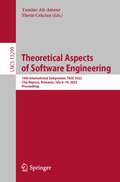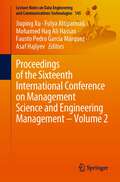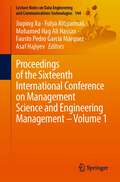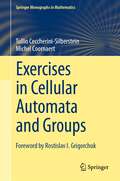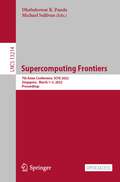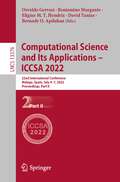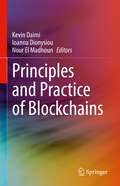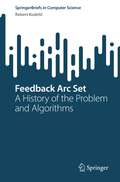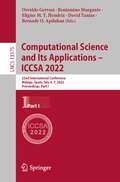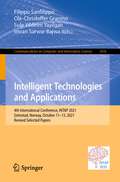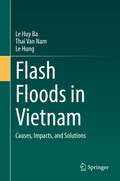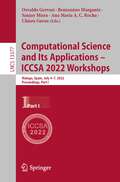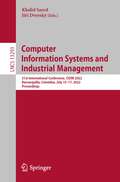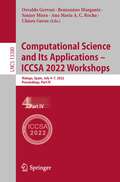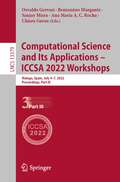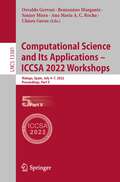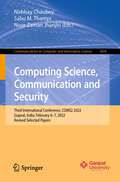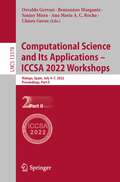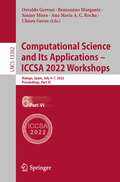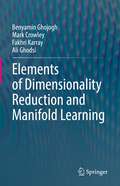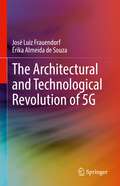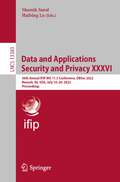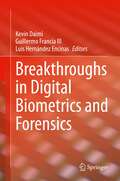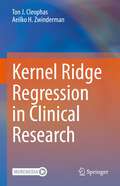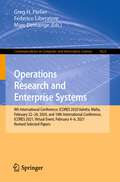- Table View
- List View
Theoretical Aspects of Software Engineering: 16th International Symposium, TASE 2022, Cluj-Napoca, Romania, July 8–10, 2022, Proceedings (Lecture Notes in Computer Science #13299)
by Yamine Aït-Ameur Florin CrăciunThis book constitutes the proceedings of the 16th International Conference on Theoretical Aspects of Software Engineering, TASE 2022, held in Cluj-Napoca, Romania, July 2022. The 21 full regular papers presented together with 5 short papers in this book were carefully reviewed and selected from 71 submissions. The topics of the papers covering various fields in software engineering and the latest developments in in formal and theoretical software engineering methods and techniques.
Proceedings of the Sixteenth International Conference on Management Science and Engineering Management – Volume 2 (Lecture Notes on Data Engineering and Communications Technologies #145)
by Jiuping Xu Fulya Altiparmak Mohamed Hag Ali Hassan Fausto Pedro García Márquez Asaf HajiyevThis book covers many hot topics, including theoretical and practical research in many areas such as dynamic analysis, machine learning, supply chain management, operations management, environmental management, uncertainty, and health and hygiene. It showcases advanced management concepts and innovative ideas. The 16th International Conference on Management Science and Engineering Management (2022 ICMSEM) will be held in Ankara, Turkey during August 3-6, 2022. ICMSEM has always been committed to promoting innovation management science (M-S) and engineering management (EM) academic research and development. The book provides researchers and practitioners in the field of Management Science and Engineering Management (MSEM) with the latest, cutting-edge thinking and research in the field. It will appeal to readers interested in these fields, especially those looking for new ideas and research directions.
Proceedings of the Sixteenth International Conference on Management Science and Engineering Management – Volume 1 (Lecture Notes on Data Engineering and Communications Technologies #144)
by Jiuping Xu Fulya Altiparmak Mohamed Hag Ali Hassan Fausto Pedro García Márquez Asaf HajiyevThis book covers many hot topics, including theoretical and practical research in many areas such as dynamic analysis, machine learning, supply chain management, operations management, environmental management, uncertainty, and health and hygiene. It showcases advanced management concepts and innovative ideas. The 16th International Conference on Management Science and Engineering Management (2022 ICMSEM) will be held in Ankara, Turkey, during August 3-6, 2022. ICMSEM has always been committed to promoting innovation management science (M-S) and engineering management (EM) academic research and development. The book provides researchers and practitioners in the field of Management Science and Engineering Management (MSEM) with the latest, cutting-edge thinking and research in the field. It will appeal to readers interested in these fields, especially those looking for new ideas and research directions.
Exercises in Cellular Automata and Groups (Springer Monographs in Mathematics)
by Tullio Ceccherini-Silberstein Michel CoornaertThis book complements the authors’ monograph Cellular Automata and Groups [CAG] (Springer Monographs in Mathematics). It consists of more than 600 fully solved exercises in symbolic dynamics and geometric group theory with connections to geometry and topology, ring and module theory, automata theory and theoretical computer science. Each solution is detailed and entirely self-contained, in the sense that it only requires a standard undergraduate-level background in abstract algebra and general topology, together with results established in [CAG] and in previous exercises. It includes a wealth of gradually worked out examples and counterexamples presented here for the first time in textbook form. Additional comments provide some historical and bibliographical information, including an account of related recent developments and suggestions for further reading. The eight-chapter division from [CAG] is maintained. Each chapter begins with a summary of the main definitions and results contained in the corresponding chapter of [CAG]. The book is suitable either for classroom or individual use.Foreword by Rostislav I. Grigorchuk
Supercomputing Frontiers: 7th Asian Conference, SCFA 2022, Singapore, March 1–3, 2022, Proceedings (Lecture Notes in Computer Science #13214)
by Dhabaleswar K. Panda Michael SullivanThis open access book constitutes the refereed proceedings of the 7th Asian Conference Supercomputing Conference, SCFA 2022, which took place in Singapore in March 2022. The 8 full papers presented in this book were carefully reviewed and selected from 21 submissions. They cover a range of topics including file systems, memory hierarchy, HPC cloud platform, container image configuration workflow, large-scale applications, and scheduling.
Computational Science and Its Applications – ICCSA 2022: 22nd International Conference, Malaga, Spain, July 4–7, 2022, Proceedings, Part II (Lecture Notes in Computer Science #13376)
by Osvaldo Gervasi Beniamino Murgante Eligius M. T. Hendrix David Taniar Bernady O. ApduhanThe eight-volume set LNCS 13375 – 13382 constitutes the proceedings of the 22nd International Conference on Computational Science and Its Applications, ICCSA 2022, which was held in Malaga, Spain during July 4 – 7, 2022. The first two volumes contain the proceedings from ICCSA 2022, which are the 57 full and 24 short papers presented in these books were carefully reviewed and selected from 279 submissions. The other six volumes present the workshop proceedings, containing 285 papers out of 815 submissions. These six volumes includes the proceedings of the following workshops:Advances in Artificial Intelligence Learning Technologies: Blended Learning, STEM, Computational Thinking and Coding (AAILT 2022); Workshop on Advancements in Applied Machine-learning and Data Analytics (AAMDA 2022); Advances in information Systems and Technologies for Emergency management, risk assessment and mitigation based on the Resilience (ASTER 2022); Advances in Web Based Learning (AWBL 2022); Blockchain and Distributed Ledgers: Technologies and Applications (BDLTA 2022); Bio and Neuro inspired Computing and Applications (BIONCA 2022); Configurational Analysis For Cities (CA Cities 2022); Computational and Applied Mathematics (CAM 2022), Computational and Applied Statistics (CAS 2022); Computational Mathematics, Statistics and Information Management (CMSIM); Computational Optimization and Applications (COA 2022); Computational Astrochemistry (CompAstro 2022); Computational methods for porous geomaterials (CompPor 2022); Computational Approaches for Smart, Conscious Cities (CASCC 2022); Cities, Technologies and Planning (CTP 2022); Digital Sustainability and Circular Economy (DiSCE 2022); Econometrics and Multidimensional Evaluation in Urban Environment (EMEUE 2022); Ethical AI applications for a human-centered cyber society (EthicAI 2022); Future Computing System Technologies and Applications (FiSTA 2022); Geographical Computing and Remote Sensing for Archaeology (GCRSArcheo 2022); Geodesign in Decision Making: meta planning and collaborative design for sustainable and inclusive development (GDM 2022); Geomatics in Agriculture and Forestry: new advances and perspectives (GeoForAgr 2022); Geographical Analysis, Urban Modeling, Spatial Statistics (Geog-An-Mod 2022); Geomatics for Resource Monitoring and Management (GRMM 2022); International Workshop on Information and Knowledge in the Internet of Things (IKIT 2022); 13th International Symposium on Software Quality (ISSQ 2022); Land Use monitoring for Sustanability (LUMS 2022); Machine Learning for Space and Earth Observation Data (MALSEOD 2022); Building multi-dimensional models for assessing complex environmental systems (MES 2022); MOdels and indicators for assessing and measuring the urban settlement deVElopment in the view of ZERO net land take by 2050 (MOVEto0 2022); Modelling Post-Covid cities (MPCC 2022); Ecosystem Services: nature’s contribution to people in practice. Assessment frameworks, models, mapping, and implications (NC2P 2022); New Mobility Choices For Sustainable and Alternative Scenarios (NEMOB 2022); 2nd Workshop on Privacy in the Cloud/Edge/IoT World (PCEIoT 2022); Psycho-Social Analysis of Sustainable Mobility in The Pre- and Post-Pandemic Phase (PSYCHE 2022); Processes, methods and tools towards RESilient cities and cultural heritage prone to SOD and ROD disasters (RES 2022); Scientific Computing Infrastructure (SCI 2022); Socio-Economic and Environmental Models for Land Use Management (SEMLUM 2022); 14th International Symposium on Software Engineering Processes and Applications (SEPA 2022); Ports of the future - smartness and sustainability (SmartPorts 2022); Smart Tourism (SmartTourism 2022); Sustainability Performance Assessment: models, approaches and applications toward interdisciplinary and integrated solutions (SPA 2022); Specifics of smart cities development in Europe (SPEED 2022); Smart and Sustainable Island Communities (SSIC 2022); Theoretical and Computational Chemistryand its Applications (TCCMA 2022); Transport Infr
Principles and Practice of Blockchains
by Kevin Daimi Ioanna Dionysiou Nour El MadhounThis book provides an essential compilation of relevant and cutting edge academic and industry work on key Blockchain topics. This book concentrates on a wide range of advances related to Blockchains which include, among others, Blockchain principles, architecture and concepts with emphasis on key and innovative theories, methodologies, schemes and technologies of Blockchain, Blockchain platforms and architecture, Blockchain protocols, sensors and devices for Blockchain, Blockchain foundations, and reliability analysis of Blockchain-based systems. Further, it provides a glimpse of future directions where cybersecurity applications are headed. The book is a rich collection of carefully selected and reviewed manuscripts written by diverse cybersecurity application experts in the listed fields and edited by prominent cybersecurity applications researchers and specialists.
Feedback Arc Set: A History of the Problem and Algorithms (SpringerBriefs in Computer Science)
by Robert KudelićThe main aim of the book is to give a review of all relevant information regarding a well-known and important problem of Feedback Arc Set (FAS). This review naturally also includes a history of the problem, as well as specific algorithms. To this point such a work does not exist: There are sources where one can find incomplete and perhaps untrustworthy information. With this book, information about FAS can be found easily in one place: formulation, description, theoretical background, applications, algorithms etc. Such a compendium will be of help to people involved in research, but also to people that want to quickly acquaint themselves with the problem and need reliable information. Thus research, professional work and learning can proceed in a more streamlined and faster way.
Computational Science and Its Applications – ICCSA 2022: 22nd International Conference, Malaga, Spain, July 4–7, 2022, Proceedings, Part I (Lecture Notes in Computer Science #13375)
by Osvaldo Gervasi Beniamino Murgante Eligius M. T. Hendrix David Taniar Bernady O. ApduhanThe eight-volume set LNCS 13375 – 13382 constitutes the proceedings of the 22nd International Conference on Computational Science and Its Applications, ICCSA 2022, which was held in Malaga, Spain during July 4 – 7, 2022. The first two volumes contain the proceedings from ICCSA 2022, which are the 57 full and 24 short papers presented in these books were carefully reviewed and selected from 279 submissions. The other six volumes present the workshop proceedings, containing 285 papers out of 815 submissions. These six volumes includes the proceedings of the following workshops:Advances in Artificial Intelligence Learning Technologies: Blended Learning, STEM, Computational Thinking and Coding (AAILT 2022); Workshop on Advancements in Applied Machine-learning and Data Analytics (AAMDA 2022); Advances in information Systems and Technologies for Emergency management, risk assessment and mitigation based on the Resilience (ASTER 2022); Advances in Web Based Learning (AWBL 2022); Blockchain and Distributed Ledgers: Technologies and Applications (BDLTA 2022); Bio and Neuro inspired Computing and Applications (BIONCA 2022); Configurational Analysis For Cities (CA Cities 2022); Computational and Applied Mathematics (CAM 2022), Computational and Applied Statistics (CAS 2022); Computational Mathematics, Statistics and Information Management (CMSIM); Computational Optimization and Applications (COA 2022); Computational Astrochemistry (CompAstro 2022); Computational methods for porous geomaterials (CompPor 2022); Computational Approaches for Smart, Conscious Cities (CASCC 2022); Cities, Technologies and Planning (CTP 2022); Digital Sustainability and Circular Economy (DiSCE 2022); Econometrics and Multidimensional Evaluation in Urban Environment (EMEUE 2022); Ethical AI applications for a human-centered cyber society (EthicAI 2022); Future Computing System Technologies and Applications (FiSTA 2022); Geographical Computing and Remote Sensing for Archaeology (GCRSArcheo 2022); Geodesign in Decision Making: meta planning and collaborative design for sustainable and inclusive development (GDM 2022); Geomatics in Agriculture and Forestry: new advances and perspectives (GeoForAgr 2022); Geographical Analysis, Urban Modeling, Spatial Statistics (Geog-An-Mod 2022); Geomatics for Resource Monitoring and Management (GRMM 2022); International Workshop on Information and Knowledge in the Internet of Things (IKIT 2022); 13th International Symposium on Software Quality (ISSQ 2022); Land Use monitoring for Sustanability (LUMS 2022); Machine Learning for Space and Earth Observation Data (MALSEOD 2022); Building multi-dimensional models for assessing complex environmental systems (MES 2022); MOdels and indicators for assessing and measuring the urban settlement deVElopment in the view of ZERO net land take by 2050 (MOVEto0 2022); Modelling Post-Covid cities (MPCC 2022); Ecosystem Services: nature’s contribution to people in practice. Assessment frameworks, models, mapping, and implications (NC2P 2022); New Mobility Choices For Sustainable and Alternative Scenarios (NEMOB 2022); 2nd Workshop on Privacy in the Cloud/Edge/IoT World (PCEIoT 2022); Psycho-Social Analysis of Sustainable Mobility in The Pre- and Post-Pandemic Phase (PSYCHE 2022); Processes, methods and tools towards RESilient cities and cultural heritage prone to SOD and ROD disasters (RES 2022); Scientific Computing Infrastructure (SCI 2022); Socio-Economic and Environmental Models for Land Use Management (SEMLUM 2022); 14th International Symposium on Software Engineering Processes and Applications (SEPA 2022); Ports of the future - smartness and sustainability (SmartPorts 2022); Smart Tourism (SmartTourism 2022); Sustainability Performance Assessment: models, approaches and applications toward interdisciplinary and integrated solutions (SPA 2022); Specifics of smart cities development in Europe (SPEED 2022); Smart and Sustainable Island Communities (SSIC 2022); Theoretical and Computational Chemistryand its Applications (TCCMA 2022); Transport Infr
Intelligent Technologies and Applications: 4th International Conference, INTAP 2021, Grimstad, Norway, October 11–13, 2021, Revised Selected Papers (Communications in Computer and Information Science #1616)
by Filippo Sanfilippo Ole-Christoffer Granmo Sule Yildirim Yayilgan Imran Sarwar BajwaThis book constitutes the refereed proceedings of the 4th International Conference on Intelligent Technologies and Applications, INTAP 2021, held in Grimstad, Norway, October 11–13, 2021.The 33 full papers included in this book were carefully reviewed and selected from 243 submissions. They were organized in topical sections as follows: Intelligence, Decision support systems, IoT; Robotics; ML and AI for Intelligent Health, Applications of intelligent technologies in Emergency Management; Smart Electrical Energy Systems, AI and ML in Security; ML and AI for sensing technologies, Social Media Analytics; ML in energy sectors and materials; and Miscellaneous.
Flash Floods in Vietnam: Causes, Impacts, and Solutions
by Le Huy Ba Thai Van Nam Le HungThis book discusses the threats and impacts of flash floods in Vietnam on environmental, human, and socio-economic resources, and covers monitoring, forecasting, warning, urgent action plans, and prevention solutions. While the work focuses on cases in Vietnam, it is applicable to many regions in the world that experience flash flooding as a common occurrence. Through data collection, field surveys, and investigational statistics from a specialized group of authors, the book provides comprehensive background knowledge on flash floods, and a flash flood hazard map using remote sensing and GIS techniques that can be used to assess the likelihood and potential impacts of flash floods before vulnerable areas and populations can be threatened. The intended audience of this manuscript is people interested in the fields of weather, environment, and natural disasters. It will serve as a reference for environmental managers, administrators of disaster planning, and extreme weather scientists.
Computational Science and Its Applications – ICCSA 2022 Workshops: Malaga, Spain, July 4–7, 2022, Proceedings, Part I (Lecture Notes in Computer Science #13377)
by Osvaldo Gervasi Beniamino Murgante Sanjay Misra Ana Maria A. C. Rocha Chiara GarauThe eight-volume set LNCS 13375 – 13382 constitutes the proceedings of the 22nd International Conference on Computational Science and Its Applications, ICCSA 2022, which was held in Malaga, Spain during July 4 – 7, 2022. The first two volumes contain the proceedings from ICCSA 2022, which are the 57 full and 24 short papers presented in these books were carefully reviewed and selected from 279 submissions. The other six volumes present the workshop proceedings, containing 285 papers out of 815 submissions. These six volumes includes the proceedings of the following workshops:Advances in Artificial Intelligence Learning Technologies: Blended Learning, STEM, Computational Thinking and Coding (AAILT 2022); Workshop on Advancements in Applied Machine-learning and Data Analytics (AAMDA 2022); Advances in information Systems and Technologies for Emergency management, risk assessment and mitigation based on the Resilience (ASTER 2022); Advances in Web Based Learning (AWBL 2022); Blockchain and Distributed Ledgers: Technologies and Applications (BDLTA 2022); Bio and Neuro inspired Computing and Applications (BIONCA 2022); Configurational Analysis For Cities (CA Cities 2022); Computational and Applied Mathematics (CAM 2022), Computational and Applied Statistics (CAS 2022); Computational Mathematics, Statistics and Information Management (CMSIM); Computational Optimization and Applications (COA 2022); Computational Astrochemistry (CompAstro 2022); Computational methods for porous geomaterials (CompPor 2022); Computational Approaches for Smart, Conscious Cities (CASCC 2022); Cities, Technologies and Planning (CTP 2022); Digital Sustainability and Circular Economy (DiSCE 2022); Econometrics and Multidimensional Evaluation in Urban Environment (EMEUE 2022); Ethical AI applications for a human-centered cyber society (EthicAI 2022); Future Computing System Technologies and Applications (FiSTA 2022); Geographical Computing and Remote Sensing for Archaeology (GCRSArcheo 2022); Geodesign in Decision Making: meta planning and collaborative design for sustainable and inclusive development (GDM 2022); Geomatics in Agriculture and Forestry: new advances and perspectives (GeoForAgr 2022); Geographical Analysis, Urban Modeling, Spatial Statistics (Geog-An-Mod 2022); Geomatics for Resource Monitoring and Management (GRMM 2022); International Workshop on Information and Knowledge in the Internet of Things (IKIT 2022); 13th International Symposium on Software Quality (ISSQ 2022); Land Use monitoring for Sustanability (LUMS 2022); Machine Learning for Space and Earth Observation Data (MALSEOD 2022); Building multi-dimensional models for assessing complex environmental systems (MES 2022); MOdels and indicators for assessing and measuring the urban settlement deVElopment in the view of ZERO net land take by 2050 (MOVEto0 2022); Modelling Post-Covid cities (MPCC 2022); Ecosystem Services: nature’s contribution to people in practice. Assessment frameworks, models, mapping, and implications (NC2P 2022); New Mobility Choices For Sustainable and Alternative Scenarios (NEMOB 2022); 2nd Workshop on Privacy in the Cloud/Edge/IoT World (PCEIoT 2022); Psycho-Social Analysis of Sustainable Mobility in The Pre- and Post-Pandemic Phase (PSYCHE 2022); Processes, methods and tools towards RESilient cities and cultural heritage prone to SOD and ROD disasters (RES 2022); Scientific Computing Infrastructure (SCI 2022); Socio-Economic and Environmental Models for Land Use Management (SEMLUM 2022); 14th International Symposium on Software Engineering Processes and Applications (SEPA 2022); Ports of the future - smartness and sustainability (SmartPorts 2022); Smart Tourism (SmartTourism 2022); Sustainability Performance Assessment: models, approaches and applications toward interdisciplinary and integrated solutions (SPA 2022); Specifics of smart cities development in Europe (SPEED 2022); Smart and Sustainable Island Communities (SSIC 2022); Theoretical and Computational Chemistryand its Applications (TCCMA 2022); Transport Infr
Computer Information Systems and Industrial Management: 21st International Conference, CISIM 2022, Barranquilla, Colombia, July 15–17, 2022, Proceedings (Lecture Notes in Computer Science #13293)
by Khalid Saeed Jiří DvorskýThis book constitutes the proceedings of the 21st International Conference on Computer Information Systems and Industrial Management Applications, CISIM 2022, held in Barranquilla, Colombia, in July 2022. The 28 papers presented together with 3 keynotes were carefully reviewed and selected from 68 submissions. The main topics covered by the chapters in this book are biometrics, security systems, multimedia, classification and clustering, and industrial management as well as interesting papers on computer information systems as applied to wireless networks, computer graphics, and intelligent systems.
Computational Science and Its Applications – ICCSA 2022 Workshops: Malaga, Spain, July 4–7, 2022, Proceedings, Part IV (Lecture Notes in Computer Science #13380)
by Osvaldo Gervasi Beniamino Murgante Sanjay Misra Ana Maria A. C. Rocha Chiara GarauThe eight-volume set LNCS 13375 – 13382 constitutes the proceedings of the 22nd International Conference on Computational Science and Its Applications, ICCSA 2022, which was held in Malaga, Spain during July 4 – 7, 2022. The first two volumes contain the proceedings from ICCSA 2022, which are the 57 full and 24 short papers presented in these books were carefully reviewed and selected from 279 submissions. The other six volumes present the workshop proceedings, containing 285 papers out of 815 submissions. These six volumes includes the proceedings of the following workshops: Advances in Artificial Intelligence Learning Technologies: Blended Learning, STEM, Computational Thinking and Coding (AAILT 2022); Workshop on Advancements in Applied Machine-learning and Data Analytics (AAMDA 2022); Advances in information Systems and Technologies for Emergency management, risk assessment and mitigation based on the Resilience (ASTER 2022); Advances in Web Based Learning (AWBL 2022); Blockchain and Distributed Ledgers: Technologies and Applications (BDLTA 2022); Bio and Neuro inspired Computing and Applications (BIONCA 2022); Configurational Analysis For Cities (CA Cities 2022); Computational and Applied Mathematics (CAM 2022), Computational and Applied Statistics (CAS 2022); Computational Mathematics, Statistics and Information Management (CMSIM); Computational Optimization and Applications (COA 2022); Computational Astrochemistry (CompAstro 2022); Computational methods for porous geomaterials (CompPor 2022); Computational Approaches for Smart, Conscious Cities (CASCC 2022); Cities, Technologies and Planning (CTP 2022); Digital Sustainability and Circular Economy (DiSCE 2022); Econometrics and Multidimensional Evaluation in Urban Environment (EMEUE 2022); Ethical AI applications for a human-centered cyber society (EthicAI 2022); Future Computing System Technologies and Applications (FiSTA 2022); Geographical Computing and Remote Sensing for Archaeology (GCRSArcheo 2022); Geodesign in Decision Making: meta planning and collaborative design for sustainable and inclusive development (GDM 2022); Geomatics in Agriculture and Forestry: new advances and perspectives (GeoForAgr 2022); Geographical Analysis, Urban Modeling, Spatial Statistics (Geog-An-Mod 2022); Geomatics for Resource Monitoring and Management (GRMM 2022); International Workshop on Information and Knowledge in the Internet of Things (IKIT 2022); 13th International Symposium on Software Quality (ISSQ 2022); Land Use monitoring for Sustanability (LUMS 2022); Machine Learning for Space and Earth Observation Data (MALSEOD 2022); Building multi-dimensional models for assessing complex environmental systems (MES 2022); MOdels and indicators for assessing and measuring the urban settlement deVElopment in the view of ZERO net land take by 2050 (MOVEto0 2022); Modelling Post-Covid cities (MPCC 2022); Ecosystem Services: nature’s contribution to people in practice. Assessment frameworks, models, mapping, and implications (NC2P 2022); New Mobility Choices For Sustainable and Alternative Scenarios (NEMOB 2022); 2nd Workshop on Privacy in the Cloud/Edge/IoT World (PCEIoT 2022); Psycho-Social Analysis of Sustainable Mobility in The Pre- and Post-Pandemic Phase (PSYCHE 2022); Processes, methods and tools towards RESilient cities and cultural heritage prone to SOD and ROD disasters (RES 2022); Scientific Computing Infrastructure (SCI 2022); Socio-Economic and Environmental Models for Land Use Management (SEMLUM 2022); 14th International Symposium on Software Engineering Processes and Applications (SEPA 2022); Ports of the future - smartness and sustainability (SmartPorts 2022); Smart Tourism (SmartTourism 2022); Sustainability Performance Assessment: models, approaches and applications toward interdisciplinary and integrated solutions (SPA 2022); Specifics of smart cities development in Europe (SPEED 2022); Smart and Sustainable Island Communities (SSIC 2022); Theoretical and Computational Chemistryand its Applications (TCCMA 2022); Transpor
Computational Science and Its Applications – ICCSA 2022 Workshops: Malaga, Spain, July 4–7, 2022, Proceedings, Part III (Lecture Notes in Computer Science #13379)
by Osvaldo Gervasi Beniamino Murgante Sanjay Misra Ana Maria A. C. Rocha Chiara GarauThe eight-volume set LNCS 13375 – 13382 constitutes the proceedings of the 22nd International Conference on Computational Science and Its Applications, ICCSA 2022, which was held in Malaga, Spain during July 4 – 7, 2022. The first two volumes contain the proceedings from ICCSA 2022, which are the 57 full and 24 short papers presented in these books were carefully reviewed and selected from 279 submissions. The other six volumes present the workshop proceedings, containing 285 papers out of 815 submissions. These six volumes includes the proceedings of the following workshops: Advances in Artificial Intelligence Learning Technologies: Blended Learning, STEM, Computational Thinking and Coding (AAILT 2022); Workshop on Advancements in Applied Machine-learning and Data Analytics (AAMDA 2022); Advances in information Systems and Technologies for Emergency management, risk assessment and mitigation based on the Resilience (ASTER 2022); Advances in Web Based Learning (AWBL 2022); Blockchain and Distributed Ledgers: Technologies and Applications (BDLTA 2022); Bio and Neuro inspired Computing and Applications (BIONCA 2022); Configurational Analysis For Cities (CA Cities 2022); Computational and Applied Mathematics (CAM 2022), Computational and Applied Statistics (CAS 2022); Computational Mathematics, Statistics and Information Management (CMSIM); Computational Optimization and Applications (COA 2022); Computational Astrochemistry (CompAstro 2022); Computational methods for porous geomaterials (CompPor 2022); Computational Approaches for Smart, Conscious Cities (CASCC 2022); Cities, Technologies and Planning (CTP 2022); Digital Sustainability and Circular Economy (DiSCE 2022); Econometrics and Multidimensional Evaluation in Urban Environment (EMEUE 2022); Ethical AI applications for a human-centered cyber society (EthicAI 2022); Future Computing System Technologies and Applications (FiSTA 2022); Geographical Computing and Remote Sensing for Archaeology (GCRSArcheo 2022); Geodesign in Decision Making: meta planning and collaborative design for sustainable and inclusive development (GDM 2022); Geomatics in Agriculture and Forestry: new advances and perspectives (GeoForAgr 2022); Geographical Analysis, Urban Modeling, Spatial Statistics (Geog-An-Mod 2022); Geomatics for Resource Monitoring and Management (GRMM 2022); International Workshop on Information and Knowledge in the Internet of Things (IKIT 2022); 13th International Symposium on Software Quality (ISSQ 2022); Land Use monitoring for Sustanability (LUMS 2022); Machine Learning for Space and Earth Observation Data (MALSEOD 2022); Building multi-dimensional models for assessing complex environmental systems (MES 2022); MOdels and indicators for assessing and measuring the urban settlement deVElopment in the view of ZERO net land take by 2050 (MOVEto0 2022); Modelling Post-Covid cities (MPCC 2022); Ecosystem Services: nature’s contribution to people in practice. Assessment frameworks, models, mapping, and implications (NC2P 2022); New Mobility Choices For Sustainable and Alternative Scenarios (NEMOB 2022); 2nd Workshop on Privacy in the Cloud/Edge/IoT World (PCEIoT 2022); Psycho-Social Analysis of Sustainable Mobility in The Pre- and Post-Pandemic Phase (PSYCHE 2022); Processes, methods and tools towards RESilient cities and cultural heritage prone to SOD and ROD disasters (RES 2022); Scientific Computing Infrastructure (SCI 2022); Socio-Economic and Environmental Models for Land Use Management (SEMLUM 2022); 14th International Symposium on Software Engineering Processes and Applications (SEPA 2022); Ports of the future - smartness and sustainability (SmartPorts 2022); Smart Tourism (SmartTourism 2022); Sustainability Performance Assessment: models, approaches and applications toward interdisciplinary and integrated solutions (SPA 2022); Specifics of smart cities development in Europe (SPEED 2022); Smart and Sustainable Island Communities (SSIC 2022); Theoretical and Computational Chemistryand its Applications (TCCMA 2022); Transpor
Computational Science and Its Applications – ICCSA 2022 Workshops: Malaga, Spain, July 4–7, 2022, Proceedings, Part V (Lecture Notes in Computer Science #13381)
by Osvaldo Gervasi Beniamino Murgante Sanjay Misra Ana Maria A. C. Rocha Chiara GarauThe eight-volume set LNCS 13375 – 13382 constitutes the proceedings of the 22nd International Conference on Computational Science and Its Applications, ICCSA 2022, which was held in Malaga, Spain during July 4 – 7, 2022. The first two volumes contain the proceedings from ICCSA 2022, which are the 57 full and 24 short papers presented in these books were carefully reviewed and selected from 279 submissions. The other six volumes present the workshop proceedings, containing 285 papers out of 815 submissions. These six volumes includes the proceedings of the following workshops: Advances in Artificial Intelligence Learning Technologies: Blended Learning, STEM, Computational Thinking and Coding (AAILT 2022); Workshop on Advancements in Applied Machine-learning and Data Analytics (AAMDA 2022); Advances in information Systems and Technologies for Emergency management, risk assessment and mitigation based on the Resilience (ASTER 2022); Advances in Web Based Learning (AWBL 2022); Blockchain and Distributed Ledgers: Technologies and Applications (BDLTA 2022); Bio and Neuro inspired Computing and Applications (BIONCA 2022); Configurational Analysis For Cities (CA Cities 2022); Computational and Applied Mathematics (CAM 2022), Computational and Applied Statistics (CAS 2022); Computational Mathematics, Statistics and Information Management (CMSIM); Computational Optimization and Applications (COA 2022); Computational Astrochemistry (CompAstro 2022); Computational methods for porous geomaterials (CompPor 2022); Computational Approaches for Smart, Conscious Cities (CASCC 2022); Cities, Technologies and Planning (CTP 2022); Digital Sustainability and Circular Economy (DiSCE 2022); Econometrics and Multidimensional Evaluation in Urban Environment (EMEUE 2022); Ethical AI applications for a human-centered cyber society (EthicAI 2022); Future Computing System Technologies and Applications (FiSTA 2022); Geographical Computing and Remote Sensing for Archaeology (GCRSArcheo 2022); Geodesign in Decision Making: meta planning and collaborative design for sustainable and inclusive development (GDM 2022); Geomatics in Agriculture and Forestry: new advances and perspectives (GeoForAgr 2022); Geographical Analysis, Urban Modeling, Spatial Statistics (Geog-An-Mod 2022); Geomatics for Resource Monitoring and Management (GRMM 2022); International Workshop on Information and Knowledge in the Internet of Things (IKIT 2022); 13th International Symposium on Software Quality (ISSQ 2022); Land Use monitoring for Sustanability (LUMS 2022); Machine Learning for Space and Earth Observation Data (MALSEOD 2022); Building multi-dimensional models for assessing complex environmental systems (MES 2022); MOdels and indicators for assessing and measuring the urban settlement deVElopment in the view of ZERO net land take by 2050 (MOVEto0 2022); Modelling Post-Covid cities (MPCC 2022); Ecosystem Services: nature’s contribution to people in practice. Assessment frameworks, models, mapping, and implications (NC2P 2022); New Mobility Choices For Sustainable and Alternative Scenarios (NEMOB 2022); 2nd Workshop on Privacy in the Cloud/Edge/IoT World (PCEIoT 2022); Psycho-Social Analysis of Sustainable Mobility in The Pre- and Post-Pandemic Phase (PSYCHE 2022); Processes, methods and tools towards RESilient cities and cultural heritage prone to SOD and ROD disasters (RES 2022); Scientific Computing Infrastructure (SCI 2022); Socio-Economic and Environmental Models for Land Use Management (SEMLUM 2022); 14th International Symposium on Software Engineering Processes and Applications (SEPA 2022); Ports of the future - smartness and sustainability (SmartPorts 2022); Smart Tourism (SmartTourism 2022); Sustainability Performance Assessment: models, approaches and applications toward interdisciplinary and integrated solutions (SPA 2022); Specifics of smart cities development in Europe (SPEED 2022); Smart and Sustainable Island Communities (SSIC 2022); Theoretical and Computational Chemistryand its Applications (TCCMA 2022); Transpor
Computing Science, Communication and Security: Third International Conference, COMS2 2022, Gujarat, India, February 6–7, 2022, Revised Selected Papers (Communications in Computer and Information Science #1604)
by Nirbhay Chaubey Sabu M. Thampi Noor Zaman JhanjhiThis book constitutes revised selected papers of the Third International Conference on Computing Science, Communication and Security, COMS2 2022, held in Gandhinagar, India, in February 2022. Due to the COVID-19 pandemic the conference was held virtually. The 22 full papers were thoroughly reveiwed and selected from 143 submissions. The papers present ideas, and research results on the aspects of computing science, network communication, and security.
Computational Science and Its Applications – ICCSA 2022 Workshops: Malaga, Spain, July 4–7, 2022, Proceedings, Part II (Lecture Notes in Computer Science #13378)
by Osvaldo Gervasi Beniamino Murgante Sanjay Misra Ana Maria A. C. Rocha Chiara GarauThe eight-volume set LNCS 13375 – 13382 constitutes the proceedings of the 22nd International Conference on Computational Science and Its Applications, ICCSA 2022, which was held in Malaga, Spain during July 4 – 7, 2022. The first two volumes contain the proceedings from ICCSA 2022, which are the 57 full and 24 short papers presented in these books were carefully reviewed and selected from 279 submissions. The other six volumes present the workshop proceedings, containing 285 papers out of 815 submissions. These six volumes includes the proceedings of the following workshops:Advances in Artificial Intelligence Learning Technologies: Blended Learning, STEM, Computational Thinking and Coding (AAILT 2022); Workshop on Advancements in Applied Machine-learning and Data Analytics (AAMDA 2022); Advances in information Systems and Technologies for Emergency management, risk assessment and mitigation based on the Resilience (ASTER 2022); Advances in Web Based Learning (AWBL 2022); Blockchain and Distributed Ledgers: Technologies and Applications (BDLTA 2022); Bio and Neuro inspired Computing and Applications (BIONCA 2022); Configurational Analysis For Cities (CA Cities 2022); Computational and Applied Mathematics (CAM 2022), Computational and Applied Statistics (CAS 2022); Computational Mathematics, Statistics and Information Management (CMSIM); Computational Optimization and Applications (COA 2022); Computational Astrochemistry (CompAstro 2022); Computational methods for porous geomaterials (CompPor 2022); Computational Approaches for Smart, Conscious Cities (CASCC 2022); Cities, Technologies and Planning (CTP 2022); Digital Sustainability and Circular Economy (DiSCE 2022); Econometrics and Multidimensional Evaluation in Urban Environment (EMEUE 2022); Ethical AI applications for a human-centered cyber society (EthicAI 2022); Future Computing System Technologies and Applications (FiSTA 2022); Geographical Computing and Remote Sensing for Archaeology (GCRSArcheo 2022); Geodesign in Decision Making: meta planning and collaborative design for sustainable and inclusive development (GDM 2022); Geomatics in Agriculture and Forestry: new advances and perspectives (GeoForAgr 2022); Geographical Analysis, Urban Modeling, Spatial Statistics (Geog-An-Mod 2022); Geomatics for Resource Monitoring and Management (GRMM 2022); International Workshop on Information and Knowledge in the Internet of Things (IKIT 2022); 13th International Symposium on Software Quality (ISSQ 2022); Land Use monitoring for Sustanability (LUMS 2022); Machine Learning for Space and Earth Observation Data (MALSEOD 2022); Building multi-dimensional models for assessing complex environmental systems (MES 2022); MOdels and indicators for assessing and measuring the urban settlement deVElopment in the view of ZERO net land take by 2050 (MOVEto0 2022); Modelling Post-Covid cities (MPCC 2022); Ecosystem Services: nature’s contribution to people in practice. Assessment frameworks, models, mapping, and implications (NC2P 2022); New Mobility Choices For Sustainable and Alternative Scenarios (NEMOB 2022); 2nd Workshop on Privacy in the Cloud/Edge/IoT World (PCEIoT 2022); Psycho-Social Analysis of Sustainable Mobility in The Pre- and Post-Pandemic Phase (PSYCHE 2022); Processes, methods and tools towards RESilient cities and cultural heritage prone to SOD and ROD disasters (RES 2022); Scientific Computing Infrastructure (SCI 2022); Socio-Economic and Environmental Models for Land Use Management (SEMLUM 2022); 14th International Symposium on Software Engineering Processes and Applications (SEPA 2022); Ports of the future - smartness and sustainability (SmartPorts 2022); Smart Tourism (SmartTourism 2022); Sustainability Performance Assessment: models, approaches and applications toward interdisciplinary and integrated solutions (SPA 2022); Specifics of smart cities development in Europe (SPEED 2022); Smart and Sustainable Island Communities (SSIC 2022); Theoretical and Computational Chemistryand its Applications (TCCMA 2022); Transport Infr
Computational Science and Its Applications – ICCSA 2022 Workshops: Malaga, Spain, July 4–7, 2022, Proceedings, Part VI (Lecture Notes in Computer Science #13382)
by Osvaldo Gervasi Beniamino Murgante Sanjay Misra Ana Maria A. C. Rocha Chiara GarauThe eight-volume set LNCS 13375 – 13382 constitutes the proceedings of the 22nd International Conference on Computational Science and Its Applications, ICCSA 2022, which was held in Malaga, Spain during July 4 – 7, 2022. The first two volumes contain the proceedings from ICCSA 2022, which are the 57 full and 24 short papers presented in these books were carefully reviewed and selected from 279 submissions. The other six volumes present the workshop proceedings, containing 285 papers out of 815 submissions. These six volumes includes the proceedings of the following workshops: Advances in Artificial Intelligence Learning Technologies: Blended Learning, STEM, Computational Thinking and Coding (AAILT 2022); Workshop on Advancements in Applied Machine-learning and Data Analytics (AAMDA 2022); Advances in information Systems and Technologies for Emergency management, risk assessment and mitigation based on the Resilience (ASTER 2022); Advances in Web Based Learning (AWBL 2022); Blockchain and Distributed Ledgers: Technologies and Applications (BDLTA 2022); Bio and Neuro inspired Computing and Applications (BIONCA 2022); Configurational Analysis For Cities (CA Cities 2022); Computational and Applied Mathematics (CAM 2022), Computational and Applied Statistics (CAS 2022); Computational Mathematics, Statistics and Information Management (CMSIM); Computational Optimization and Applications (COA 2022); Computational Astrochemistry (CompAstro 2022); Computational methods for porous geomaterials (CompPor 2022); Computational Approaches for Smart, Conscious Cities (CASCC 2022); Cities, Technologies and Planning (CTP 2022); Digital Sustainability and Circular Economy (DiSCE 2022); Econometrics and Multidimensional Evaluation in Urban Environment (EMEUE 2022); Ethical AI applications for a human-centered cyber society (EthicAI 2022); Future Computing System Technologies and Applications (FiSTA 2022); Geographical Computing and Remote Sensing for Archaeology (GCRSArcheo 2022); Geodesign in Decision Making: meta planning and collaborative design for sustainable and inclusive development (GDM 2022); Geomatics in Agriculture and Forestry: new advances and perspectives (GeoForAgr 2022); Geographical Analysis, Urban Modeling, Spatial Statistics (Geog-An-Mod 2022); Geomatics for Resource Monitoring and Management (GRMM 2022); International Workshop on Information and Knowledge in the Internet of Things (IKIT 2022); 13th International Symposium on Software Quality (ISSQ 2022); Land Use monitoring for Sustanability (LUMS 2022); Machine Learning for Space and Earth Observation Data (MALSEOD 2022); Building multi-dimensional models for assessing complex environmental systems (MES 2022); MOdels and indicators for assessing and measuring the urban settlement deVElopment in the view of ZERO net land take by 2050 (MOVEto0 2022); Modelling Post-Covid cities (MPCC 2022); Ecosystem Services: nature’s contribution to people in practice. Assessment frameworks, models, mapping, and implications (NC2P 2022); New Mobility Choices For Sustainable and Alternative Scenarios (NEMOB 2022); 2nd Workshop on Privacy in the Cloud/Edge/IoT World (PCEIoT 2022); Psycho-Social Analysis of Sustainable Mobility in The Pre- and Post-Pandemic Phase (PSYCHE 2022); Processes, methods and tools towards RESilient cities and cultural heritage prone to SOD and ROD disasters (RES 2022); Scientific Computing Infrastructure (SCI 2022); Socio-Economic and Environmental Models for Land Use Management (SEMLUM 2022); 14th International Symposium on Software Engineering Processes and Applications (SEPA 2022); Ports of the future - smartness and sustainability (SmartPorts 2022); Smart Tourism (SmartTourism 2022); Sustainability Performance Assessment: models, approaches and applications toward interdisciplinary and integrated solutions (SPA 2022); Specifics of smart cities development in Europe (SPEED 2022); Smart and Sustainable Island Communities (SSIC 2022); Theoretical and Computational Chemistryand its Applications (TCCMA 2022); Transpor
Elements of Dimensionality Reduction and Manifold Learning
by Benyamin Ghojogh Mark Crowley Fakhri Karray Ali GhodsiDimensionality reduction, also known as manifold learning, is an area of machine learning used for extracting informative features from data for better representation of data or separation between classes. This book presents a cohesive review of linear and nonlinear dimensionality reduction and manifold learning. Three main aspects of dimensionality reduction are covered: spectral dimensionality reduction, probabilistic dimensionality reduction, and neural network-based dimensionality reduction, which have geometric, probabilistic, and information-theoretic points of view to dimensionality reduction, respectively. The necessary background and preliminaries on linear algebra, optimization, and kernels are also explained to ensure a comprehensive understanding of the algorithms.The tools introduced in this book can be applied to various applications involving feature extraction, image processing, computer vision, and signal processing. This book is applicable to a wide audience who would like to acquire a deep understanding of the various ways to extract, transform, and understand the structure of data. The intended audiences are academics, students, and industry professionals. Academic researchers and students can use this book as a textbook for machine learning and dimensionality reduction. Data scientists, machine learning scientists, computer vision scientists, and computer scientists can use this book as a reference. It can also be helpful to statisticians in the field of statistical learning and applied mathematicians in the fields of manifolds and subspace analysis. Industry professionals, including applied engineers, data engineers, and engineers in various fields of science dealing with machine learning, can use this as a guidebook for feature extraction from their data, as the raw data in industry often require preprocessing.The book is grounded in theory but provides thorough explanations and diverse examples to improve the reader’s comprehension of the advanced topics. Advanced methods are explained in a step-by-step manner so that readers of all levels can follow the reasoning and come to a deep understanding of the concepts. This book does not assume advanced theoretical background in machine learning and provides necessary background, although an undergraduate-level background in linear algebra and calculus is recommended.
The Architectural and Technological Revolution of 5G
by José Luiz Frauendorf Érika Almeida de SouzaThe book discusses the evolution of cellular technology, then focusing in on 5G and its architecture and what it means for current engineers. The book first focuses on 4G and how it changed the industry, allowing people to communicate by connecting devices to the internet. The authors detail the emergence of services and applications that have revolutionized communication and continue to impact the daily habits of majority of the world's population. The authors endeavor to tell this story by showing the path taken until the arrival of 5G, detailing how technological and architectural progress evolved in all these years. It is a technical book, but the authors take care to explain in detail each aspect related to technology in order to allow everyone interested in the subject to delve into this important topic.Presents a comprehensive explanation about 4G and 5G architecture, modulation and protocols;Includes a thorough explanation of modern antennas technology and O-RAN;Relevant to technology professionals and students interested in 5G, but with little background in telecommunications;The English translation of this book from its Portuguese original manuscript was done with the help of artificial intelligence (machine translation by the service provider DeepL.com). A subsequent human revision of the content was done by the author.
Data and Applications Security and Privacy XXXVI: 36th Annual IFIP WG 11.3 Conference, DBSec 2022, Newark, NJ, USA, July 18–20, 2022, Proceedings (Lecture Notes in Computer Science #13383)
by Shamik Sural Haibing LuThis book constitutes the refereed proceedings of the 36th Annual IFIP WG 11.3 Conference on Data and Applications Security and Privacy, DBSec 2022, held in Newark, NJ, USA, in July 2022.The 12 full papers and 6 short papers presented were carefully reviewed and selected from 33 submissions. The conference covers research in data and applications security and privacy.
Breakthroughs in Digital Biometrics and Forensics
by Kevin Daimi Guillermo Francia Luis Hernández EncinasThis book focuses on a wide range of breakthroughs related to digital biometrics and forensics. The authors introduce the concepts, techniques, methods, approaches and trends needed by cybersecurity specialists and educators for keeping current their biometrics and forensics knowledge. Furthermore, the book provides a glimpse of future directions where biometrics and forensics techniques, policies, applications, and theories are headed. Topics include multimodal biometrics, soft biometrics, mobile biometrics, vehicle biometrics, vehicle forensics, integrity verification of digital content, people identification, biometric-based cybercrime investigation, among others. The book is a rich collection of carefully selected and reviewed manuscripts written by diverse digital biometrics and forensics experts in the listed fields and edited by prominent biometrics and forensics researchers and specialists.
Kernel Ridge Regression in Clinical Research
by Ton J. Cleophas Aeilko H. ZwindermanIBM (international business machines) has published in its SPSS statistical software 2022 update a very important novel regression method entitled Kernel Ridge Regression (KRR). It is an extension of the currently available regression methods, and is suitable for pattern recognition in high dimensional data, particularly, when alternative methods fail. Its theoretical advantages are plenty and include thekernel trick for reduced arithmetic complexity,estimation of uncertainty by Gaussians unlike histograms,corrected data-overfit by ridge regularization,availability of 8 alternative kernel density models for datafit.A very exciting and wide array of preliminary KRR research has already been published by major disciplines (like studies in quantum mechanics and nuclear physics, studies of molecular affinity / dynamics, atomisation energy studies, but also forecasting economics studies, IoT (internet of things) studies for e-networks, plant stress response studies, big data streaming studies, etc). In contrast, it is virtually unused in clinical research. This edition is the first textbook and tutorial of kernel ridge regressions for medical and healthcare students as well as recollection / update bench, and help desk for professionals. Each chapter can be studied as a standalone, and, using, real as well as hypothesized data, it tests the performance of the novel methodology against traditional regression analyses. Step by step analyses of over 20 data files stored at Supplementary Files at Springer Interlink are included for self-assessment. We should add that the authors are well qualified in their field. Professor Zwinderman is past-president of the International Society of Biostatistics (2012-2015) and Professor Cleophas is past-president of the American College of Angiology (2000-2002). From their expertise they should be able to make adequate selections of modern KRR methods for the benefit of physicians, students, and investigators. The authors have been working and publishing together for 24 years and their research can be characterized as a continued effort to demonstrate that clinical data analysis is not mathematics but rather a discipline at the interface of biology and mathematics.
Operations Research and Enterprise Systems: 9th International Conference, ICORES 2020, Valetta, Malta, February 22–24, 2020, and 10th International Conference, ICORES 2021, Virtual Event, February 4–6, 2021, Revised Selected Papers (Communications in Computer and Information Science #1623)
by Greg H. Parlier Federico Liberatore Marc DemangeThis book includes extended and revised versions of selected papers from the 9th and 10th edition of the International Conference on Operations Research and Enterprise Systems (ICORES 2020 and ICORES 2021). ICORES 2020 was held in Valletta, Malta from 22 – 24 of February 2020, and ICORES 2021 was held as an online event due to the Covid-19 pandemic, from 4 – 6 of February 2021.The 11 full papers included in this book were carefully reviewed and selected from 132 submissions. The ICORES 2020 and 2021 book contains extended and revised version of proceedings papers dealing with operations research and enterprise systems.
